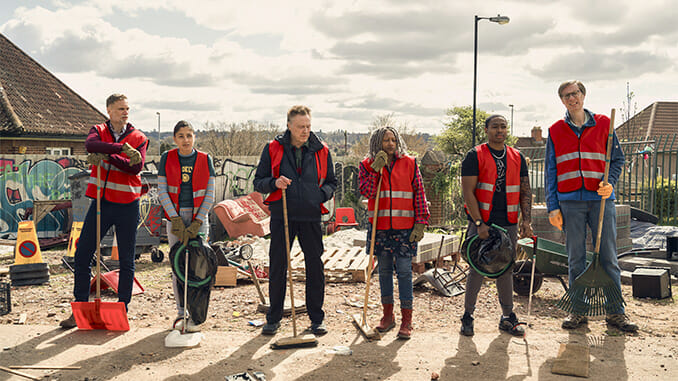Prime Video’s The Outlaws Pulls Off a Surprisingly Heartwarming Heist
Photo Courtesy of Prime Video
One of the best things about The Outlaws is that it knows exactly what it is, and tells us so right off the bat. A six episode comedy-crime series from Stephen Merchant (The Office) and Elgin James (Mayans M.C.) that originally aired on the BBC—and has now come to American shores via Amazon Prime Video—The Outlaws has a fairly simple setup. Seven strangers, picked to live in a house… no wait, wrong show. Ahem. Seven strangers who end up on the same Bristol community service group (“community payback,” as it’s called in the UK) get caught up in a dangerous plot involving a large bag of money they find on the job. And, as they work to extricate themselves from this situation and figure out what to do with the money, they end up learning some important personal lessons.
The series is so self-aware that one character even articulates in the premiere how each member of this motley crew is a “type”: John (Darren Boyd) is the right wing blow-hard; Myrna (Clare Perkins), a left-wing militant; Lady Gabby (Eleanor Tomlinson), the celebutant; Frank (Christopher Walken*) as the crafty old dodger; Christian (Gamba Cole) is the bad boy; and Rani (Rhianna Barreto)—who points all of this out—is the nerdy Asian good-girl. “Plus whatever Greg (Stephen Merchant) is.”
(*For the two people who will get this crossover reference, Christopher Walken is playing Jon Voight as Mickey Donovan from Ray Donovan).
Leaning in to these tropes helps to start, but thankfully The Outlaws soon settles in to the story it more specifically wants to tell—and it does so winningly. It’s a show that understands structure well, both rewarding our expectations and subverting them. Most of the short season’s cold opens give us a view into why each of our delinquents are wearing orange vests to begin with, but we also spend just enough time with each to get a sense of who they are outside of their crimes. None are defined by those particular actions, but there are other issues at hand; namely, each one of them is a fraud, of sort of another, trying to be someone else. How that is revealed is what gives the series a richness it would not have as strictly satire (the episodes, for better or worse, are hourlongs), and the connections among the group give the series a surprising amount of heart.
Those who are familiar with Merchant’s other TV work will note the signature style he brings to his writing, not only in making himself and his appearance the butt of many jokes, but the easy humor that patches over what are often pretty bleak situations. When Merchant’s character Greg, a hapless lawyer, trades “which one of us is more pathetic” examples with Lady Gabby, his “I’m living in a flat for divorcees where they make you pay six months in advance in case you, you know, off yourself” is the trump card. But it’s said with such a smile and perky countenance that it blunts the edge of Greg’s true sadness—a balance that defines the whole series.
-

-

-

-

-

-

-

-

-

-

-

-

-

-

-

-

-

-

-

-

-

-

-

-

-

-

-

-

-

-

-

-

-

-

-

-

-

-

-

-








































